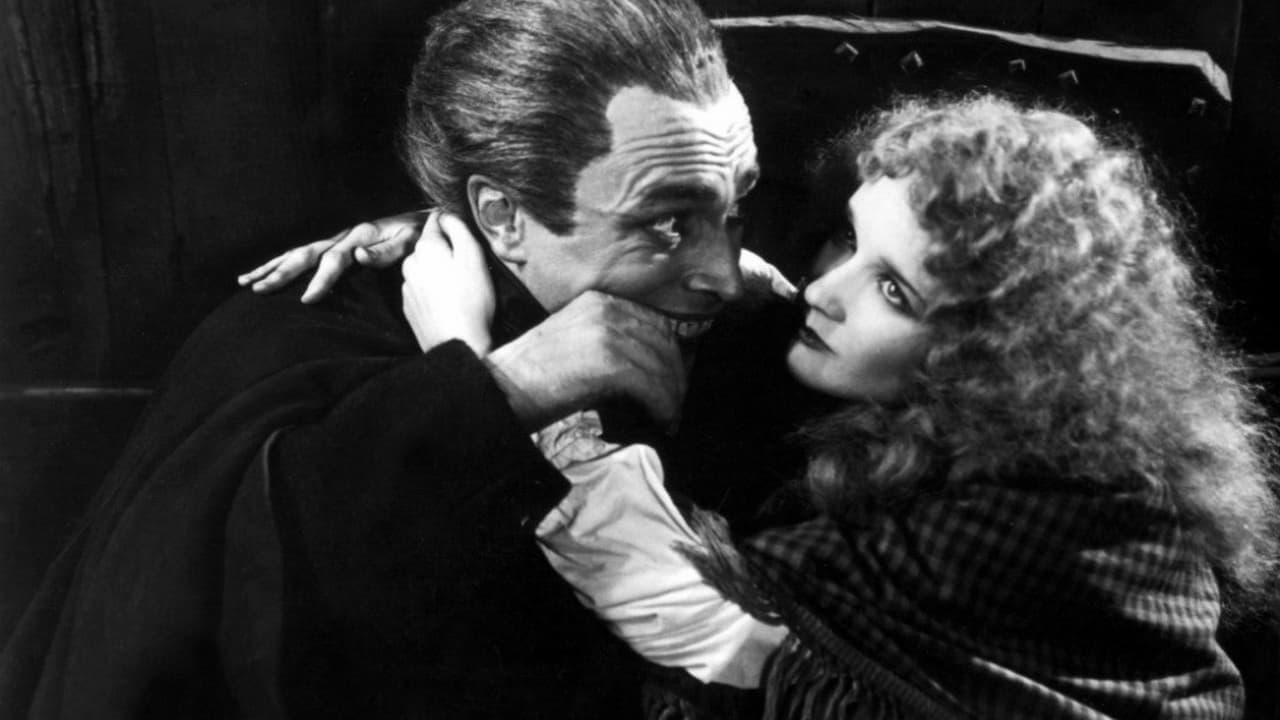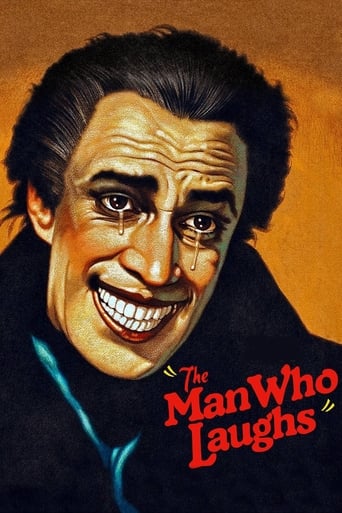Irishchatter
The reason i got to this film was because the Joker from Batman was inspired by Conrad Veidt's character in this film! By god, he did look so much like the Joker, he has the smile, make up, anything you can think so creepily. However Gwynplaine wasn't evil, he was more of a romantic and a sweetheart. Definitely, himself and Dea were a marvellous couple! At the same time, i had to give this a 6 because:1. When the characters were speaking, the textboard just said a sentence, it didn't pick up much of what they were saying to one another or even to themselves! I know this is 1920's we're talking about but, they should've got every line on what the characters had said! 2. It was too long for a silent film in my opinion. I think if they kept it to one hour and 28 minutes, it would've been sufficient!3.You could hear the background noises but you cant hear the voices of the characters?! It really doesn't make sense to me why they left the voices out when there was actually noise in this!I would call this an OK movie but it could've done a lot better tbh.................
ironhorse_iv
This is a great emotional driven picture! Directed by the German Expressionist filmmaker Paul Leni. The film is an adaptation of Victor Hugo's novel of the same name. The movie tells the story of Gwynplaine (Conrad Veidt), who bears a face disfigured by child torture into a permanent smile, because his noble father refuse to obey the King of England. He makes a living with his adopted father, Ursus (Cesare Gravina) & girlfriend, a beauty blind woman named Dea (Mary Philbin), traveling town to town, performing plays. Upon doing a show at a village fair, Gwynplaine attracts the attention of the bored, sexy, but trouble, duchess Josiana (Olga Baclanova). He soon gains more attention from the royals, after it is found out that Gwynplaine is the son and heir to Lord's position and estate. Now, Gwynplaine must choose, between a life of luxury, without love, or being poor without love. Which one will he choose? Watch the movie to find out! Without spoiling the movie too much, the movie is very powerful! It exposed the crudity and evil that exist in all of human society. Not only does, it satirically, make fun of the emptiness, immorality and meaninglessness of some of the rich, but it show the silly ugliness of some of the poor when it comes to their sinful acts. Both social classes are shown being devastating wickedness to the weak, downtrodden and disabled, lower forms of society. While, the movie can be, somewhat dark and grit, integrated with this theme is the secondary theme of the conflict between moral and immoral love-love guided by the spirit and love guided by the flesh. Hugo does very well to show that Dea loves Gwynplaine for his kind spirit, but Josiana loves him for his devilish looks. Yet, another theme to come out of this film is the struggles of man-against all the forces in life which seek to destroy his spirit and cow him to go things, against his will. In truth, Gwnplaine does not want to be forced to make a living off, of people making fun of his facial disability, but he also, doesn't want to be forced into an arranged marriage, he doesn't feel comfortable, just to live life in luxury. Gwynplaine is the symbol of the basic problem confronting mankind. He's there, to remind people of all classes, that humans are savage in nature, and that civilization can never be more than an idea. Hugo therefore chooses to him to become a satire mockery of society. A walking joke, that shows, that no matter, how civilize, we are; we are only one foot away from the jungle. Dea is the symbol of ideal love. Based on the recognition of the values held by and virtues of man, totally oblivious of man's physical appearance. Indeed, true love is blind. I just glad, they change the sad ending to a happy ending. Their character really did deserve it, after the things, they went through. Both actors did well with their roles. As much as certain critics, wanted the title role to go to the original actor, plan for this; Lon Chaney. I think Conrad Veidt did the role, much better. Conrad Veidt is captivating as Gwynplaine. The way, he able to show sadness, while smiling is haunting. Despite, what Hollywood lore, may say, Conrad Veidt never replace Lon Chaney, because Chaney storm, out, during production. They choose Conrad Veidt to replace him, because he was a better actor for the role. That shows you, how good Conrad Veidt really was. He is compelling, emotive and unforgettable in his role. Mary Philbin was the same thing. Yes, she doesn't get to do much besides smile and look pretty, but she does realistically portray a blind woman, a definite acting challenge. Her acting really remind me so much of Dorothy Gish in 1921's Orphans of the Storm. She was amazing! Olga Baclanova is very charismatic as Duchess Josiana, alluring, flirtatious and imperious. Her resemblance to modern singer Madonna in The Man Who Laughs, in both looks and attitude, is pretty strange, when you think about it. Brandon Hurst does a phenomenal job as the cruel heartless villain. He was very season. Great performance. One thing, I kinda dislike, about certain modern critics, is how they overlook this film, due to Gwynplaine's appearance. They often classified this film, as a horror movie, due to the heroes' evil looking smile. While, it's true, that the carnival freak-like grin on the character Gwynplaine's face, was a direct inspiration for The Joker character in Batman comic folklore, and yes, the movie does have some dark grotesque moments, like the Iron Maiden scene or the half frozen hanging skeletons, but that's only in the beginning of the film. The rest of the movie, feels like a sex romantic melodrama. Lots of pre-code, near-nudity. There was even some comedy. Stuart Holmes as Lord Dirry-Moir was hilarious. I think, most people mistake the German Expressionism filmmaking style as just a horror film, style. They really forget that some of the most popular film noirs, historic, or Sci-fiction films have this style. Anyways, the film was one of the early silent/sound films. Some copies of this movie does have sound effects on them. Sadly, they're somewhat annoying. The music score that came with this movie, "When Love Comes Stealing," by Walter Hirsch, Lew Pollack, and Erno Rapee is worth checking out. While, the movie is dated. This movie did help influence others films. It even got some modern remakes and some cameos in other films. Overall: This movie is compelling masterpiece. One of the best silent films ever made. The fact that this movie is hardly known today is a shame. The joke is on you, if you haven't saw this film. It's a smiling good time. Go see it! You'll be glad that you did.
wes-connors
In jolly old England, Julius Molnar Jr. (as young Gwynplaine) has a permanent grin surgically carved on his face "so he might laugh forever at his fool of a father" who refused to kiss the hand of his King. The disfigured lad rescues a blind baby, and they are adopted by fatherly Cesare Gravina (as Ursus). The children grow into Conrad Veidt (as Gwynplaine) and Mary Philbin (as Dea). The trio support themselves as a traveling freak show, featuring Mr. Veidt's "The Laughing Man" grin, which has become ever more grotesque with age. Still blind, but movie-star-beautiful as an adult, Ms. Philbin falls for her good-natured rescuer; she thinks God took her eyes so that she could see the good in "Gwynplaine". Veidt cares for Philbin, but is distracted by the possible love of a sighted woman, the seductive Olga Baclanova (as Duchess Josiana).Paul Leni's "The Man Who Laughs" makes up for a story that goes to the dogs (quite literally!) by being too beautifully produced to dismiss. Additionally, Veidt's performance is electrifying. Especially representative of his work in this film is Veidt's "seduction" scene, with Ms. Baclanova; and, she is surely the film's "Best Supporting Actress". Everyone, from Philbin to extras and bit players, is very good. Interestingly, Veidt was eligible for an Academy Award, but was not nominated. Then, neither was Lon Chaney, for "Laugh, Clown, Laugh". They had no sense of humor, obviously. ******** The Man Who Laughs (4/27/28) Paul Leni ~ Conrad Veidt, Mary Philbin, Olga Baclanova, Brandon Hurst

